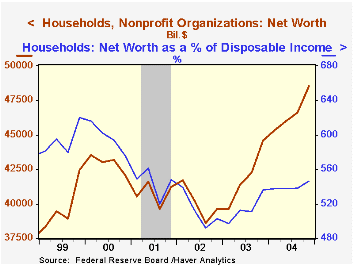 Global| Mar 10 2005
Global| Mar 10 2005Households' Net Worth A Record in 4Q04, But Not Versus Income
by:Tom Moeller
|in:Economy in Brief
Summary
The net worth of the US household sector rose 8.8% last quarter versus 4Q03 to a record $48.5 trillion. The gain failed, however, to lift net worth to a new high versus income. In fact the increase lagged the 12.5% rise in net worth [...]

The net worth of the US household sector rose 8.8% last quarter versus 4Q03 to a record $48.5 trillion. The gain failed, however, to lift net worth to a new high versus income. In fact the increase lagged the 12.5% rise in net worth during 2003 and the ratio versus disposable income rose only slightly y/y to 5.5 times versus a peak of 6.2 times in 1999.
Household sector asset values rose 9.4% y/y as the value of real estate holdings jumped 12.9%. Financial asset values rose 7.8%, half the gain in 2003 and held back by higher interest rates which reduced the growth in treasury issues to 0.6%. Money market share values fell 9.3% but foreign deposits, checkable deposits and time & savings deposits all soared. Higher prices in the stock market helped lift the value of mutual fund shares by 18.7% and the value of corporate equities held directly rose 2.3%.
Foreign sector holdings of total US assets rose 20.7% y/y raising the foreign sector's ownership share of total US financial assets to a record 12.7% versus 7.0% ten years ago.
Growth in total credit market debt outstanding was steady at 8.2% y/y. The federal government and US households continued growing debt at or about a double digit rate and non-financial corporations' debt grew a lesser 4.8% y/y though it sped up in 4Q.
Individuals' total liabilities rose 10.7% last year, the fastest since 2000, as mortgage debt grew 13.6% and consumer credit rose 4.9%.
| Flow of Funds | % of Total | 4Q04 (%, AR) |
3Q04 (%, AR) |
2004 (%, Y/Y) |
2003 (%, Y/Y) |
2002 (%, Y/Y) |
|---|---|---|---|---|---|---|
| Total Credit Market Debt Outstanding | 9.8% | 8.9% | 8.2% | 8.8% | 7.5% | |
| Federal Government | 12% | 9.9% | 8.2% | 9.0% | 10.9% | 7.6% |
| Households | 28% | 11.7% | 14.0% | 11.2% | 10.3% | 9.6% |
| Nonfinancial Corporate Business | 14% | 9.2% | 4.8% | 4.8% | 3.5% | 0.6% |
| Financial Sectors | 33% | 7.9% | 7.6% | 7.3% | 10.4% | 9.3% |
| Total Credit Market Assets | 9.8% | 8.9% | 8.2% | 8.8% | 7.5% | |
| Household Sector | 6% | 9.8% | 11.7% | 1.0% | 8.1% | -4.7% |
| Rest of World | 13% | 21.5% | 14.9% | 20.7% | 14.8% | 16.4% |
| US Financial Sectors | 76% | 8.1% | 7.9% | 7.1% | 8.2% | 7.8% |
| Net Worth: Households & Nonprofit Organizations (Trillions) | $48.5 | $46.6 | $48.5 | $44.6 | $39.6 | |
| Tangible Assets | $22.5 | $22.0 | $22.5 | $20.1 | $18.4 |
Tom Moeller
AuthorMore in Author Profile »Prior to joining Haver Analytics in 2000, Mr. Moeller worked as the Economist at Chancellor Capital Management from 1985 to 1999. There, he developed comprehensive economic forecasts and interpreted economic data for equity and fixed income portfolio managers. Also at Chancellor, Mr. Moeller worked as an equity analyst and was responsible for researching and rating companies in the economically sensitive automobile and housing industries for investment in Chancellor’s equity portfolio. Prior to joining Chancellor, Mr. Moeller was an Economist at Citibank from 1979 to 1984. He also analyzed pricing behavior in the metals industry for the Council on Wage and Price Stability in Washington, D.C. In 1999, Mr. Moeller received the award for most accurate forecast from the Forecasters' Club of New York. From 1990 to 1992 he was President of the New York Association for Business Economists. Mr. Moeller earned an M.B.A. in Finance from Fordham University, where he graduated in 1987. He holds a Bachelor of Arts in Economics from George Washington University.
More Economy in Brief
 Global| Feb 05 2026
Global| Feb 05 2026Charts of the Week: Balanced Policy, Resilient Data and AI Narratives
by:Andrew Cates






